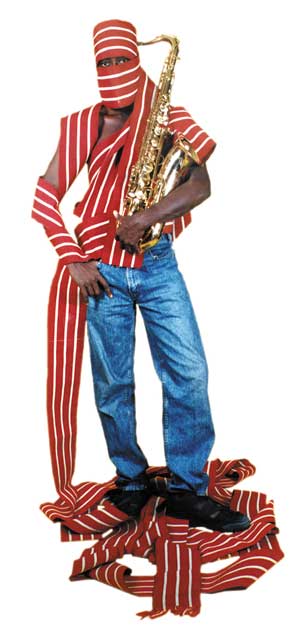| |
Call
out the name Lágbájá in Yoruba and you
could be calling for somebody, anybody, everybody, or nobody!
The Nigerian musician Lágbájá uses that
name and has made a commitment to always wear a mask on stage
to hide his identity. He is described by the phrase: 'The man
without a face who speaks for the people without a voice'. His
masks and costumes have many different designs.
Generally Lágbájá's
music blends jazz, afrobeat, highlife, juju, funk and traditional
Yoruba music, using horns, guitars and keyboards along with
traditional Nigerian instruments. Sometimes the music is purely
instrumental but when there are lyrics, they are in Yoruba,
English or the combination of the two commonly spoken in Lagos.
The lyrics focus on issues relating to democracy and fairness
in society, just the titles of the songs themselves get the
desired message across. On the other hand some of his songs
can be for sheer enjoyment rather than complaining all the time!
Lágbájá's 1996 recording C'est Une African
Thing topped Nigeria's charts with hits 'Coolu Temper'
and 'Bad Leadership'. His songs also feature on several Nigerian
and afrobeat compilations. Also in 1996, Lágbájá
was part of the International Red Cross-sponsored campaign called
'Music goes to War' that aimed to draw world attention to the
plight of child soldiers in war torn countries in Africa. He
joined Papa Wemba, Lucky Dube, Youssou N'Dour, Lourdes Van-Dunem
and Jabu Khanyile to meet people in major African trouble spots,
including south Sudan, Angola and Liberia culminating in a concert
in Paris and a CD was recorded too (see Features).
Lágbájá says that the experience was so
powerful that even now if inspiration comes he will still sing
songs along the same lines, to educate about tolerance.
In 1997 Lágbájá opened
a club called Motherlan' Niteclub in Lagos. As a saxophonist
and vocalist he performs there with his 12-piece band on a regular
basis.
Lágbájá won six national |

Nigerian
music awards in 2001, including Artist of
the Year, Producer of the Year,
and Album of
the Year. His first international album, WE before ME
was released in 2001. He toured USA for the first time the same
year and he is now embarking on more international concerts,
for example in Ghana, France, Brazil, Britain. He
and his band performed on the Africa stage at the BBC Music
Live festival over the Golden Jubilee Celebrations at London's
Hyde Park in summer 2002. He is pleased to see
how responsive his audiences are, connecting with the grooves
and is keen for his songs to reach more African countries. Lágbájá
is definitely one of Africa's most exciting contemporary artists
whose elaborate masks and stage costumes link him to the ancient
tradition of Egungun: ancestral masqueraded spirits who help
guide the people towards truth and peace.
There is no doubt that it's high time
the world sat up and took notice of Lágbájá
and his music. |
![]()